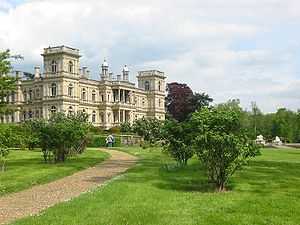Château de Ferrières
| Château de Ferrières | |
|---|---|
 | |
 | |
| General information | |
| Type | Château |
| Architectural style | Neo-Renaissance |
| Location | Ferrières-en-Brie, Seine-et-Marne, France |
| Coordinates | 48°49′11″N 2°42′43″E / 48.81972°N 2.71194°ECoordinates: 48°49′11″N 2°42′43″E / 48.81972°N 2.71194°E |
| Construction started | 1855 |
| Completed | 1859 |
Château de Ferrières (French pronunciation: [ʃɑto də fɛʁjɛːʁ]) is a French château built between 1855 and 1859 by Baron James de Rothschild in the Goût Rothschild. Rothschild ownership of the Château de Ferrières was passed down through the male line according to the rule of primogeniture. Considered by far the largest and most luxurious 19th-century château in France, it is reached from rue Rucherie in Ferrières-en-Brie in the Seine et Marne département of France about 26 km east of Paris.
Sitting at the crest of a long entry drive, the château was designed by the British architect Joseph Paxton. The inspiration for the design of Ferrières was Mentmore Towers in Buckinghamshire, England, the house Paxton built for Baron James's cousin Mayer Amschel de Rothschild. On seeing Mentmore, Baron James is reputed to have summoned Paxton and ordered "Build me a Mentmore, but twice the size" [1]
Built in the Neo-Renaissance style inspired by architecture of the Italian Renaissance, with square towers at each corner, the house sits on a formal terrace that gives way to 1.25 km² of gardens in a parkland landscaped à l'anglaise that was part of a surrounding 30 km² forest contained in the estate. The showpiece central hall is 120 feet (37 m) long and 60 feet (18 m) high, its roof a full glass skylight. The sculpting of the interior atlas columns and caryatids was by Charles Henri Joseph Cordier and the decorative painting supervised by Eugène Lami. The massive library held more than 8,000 volumes. Because lavish entertaining was important, in addition to the private Rothschild apartments, the Château de Ferrières was built with eighty guest suites. Ferrières was inaugurated 16 December 1862 with a gala attended by Napoleon III.
Baron James acquired a vast collection of works of art, and statues adorned a number of the château's rooms. Several of the many sculptures were by Alexandre Falguière and the 18th-century Italian, Antonio Corradini and the Baron's son later added works by René de Saint-Marceaux.
| "No Kings could afford this! It could only belong to a Rothschild" |
| — Wilhelm I, the Emperor of Germany, on visiting Ferrières.[2] |
During the Franco-Prussian War of 1870-71, the Château de Ferrières was seized by the Germans and was the site of negotiations between Otto von Bismarck, Chancellor of the North German Confederation, and the French Minister of Foreign Affairs, Jules Favre. The Germans again seized the château during the occupation of France in World War II and this time, looted its vast art collections.
The château remained empty until 1959 when Guy de Rothschild and his new wife, Marie-Hélène de Zuylen van Nyeve set about refurbishing it.
From 1959, they hosted regular parties at the Château, the theme of which would be personally designed by artists or designers such as Yves Saint Laurent. Their parties would mainly consist of aristocracy, but they always included many of her friends from a wider society such as Brigitte Bardot, Grace Kelly and Audrey Hepburn.[3]
In 1975, Guy de Rothschild and his wife charitably donated the château to the chancellery of the University of Paris, and it is now open to the public for guided tours and special events.
Certain scenes in the Roman Polanski film The Ninth Gate (2000) and an episode of the TV series Relic Hunter were filmed at the Château de Ferrières.